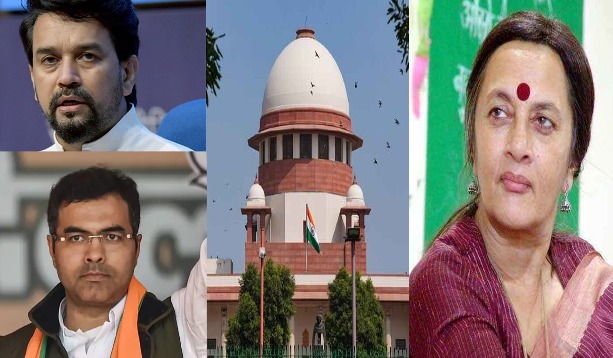
The Supreme Court on Monday issued a notice on a petition filed by Communist Party of India (Marxist) leader Brinda Karat seeking the filing of an FIR against BJP politicians Anurag Thakur and Parvesh Verma for allegedly delivering hate speeches in 2020.
A bench of Justices KM Joseph and BV Nagarathna was hearing a special leave petition filed by Karat against the Delhi High Court’s order of dismissal of the Writ Petition against a trial court ruling rejecting her petition for the filing of FIRs against BJP leaders.
While issuing notice, the Supreme Court observed that prima facie, the Magistrate’s position that sanction is necessary to lodge a FIR in the case appears to be incorrect. The notice becomes returnable in three weeks.
Karat’s petition relates to several speeches given by the two politicians, including one given on January 27, 2020 at a rally with the motto “desh ke gaddaron ko, goli maaron saalon ko.” Another speech given by Parvesh Verma on January 27-28, 2020, while campaigning for the BJP, and afterwards in an interview with the media, has also been mentioned.
Senior Advocate Siddharth Agarwal, representing the CPI(M) leader, highlighted that the Election Commission had taken action and restricted them from campaigning for a set number of hours. The ‘goli maaro’ rhetoric was converted into real action after a protester was shot within the next few days. The senior counsel further claimed that the Delhi High Court had in a collateral proceeding commented adversely on speeches.
However, citing a lack of sanction, the Magistrate refused to order the registration of a FIR.
He argued that the Magistrate’s decision, which dealt with the necessity for sanction to record a FIR, was made in the context of the Prevention of Corruption Act. “It has no bearing on IPC offences.” FIR does not require a sanction. The lower courts were entirely wrong. “Three years have passed and no FIR has been registered,” he claimed.
He also referred to a Supreme Court judgement passed last year, which stated that police should take action on hate speech instances without waiting for a complaint.
Agarwal argued that it was more than just overturning a magistrate’s order, “It was also a matter of establishing some standards for how such an issue should be handled, something only a writ can do. It is firmly established that alternative remedies do not infringe on the High Court’s jurisdiction. It would have been a different story if the HC had relegated it to the preliminary stage.”
During the hearing, Justice Joseph questioned how Section 153A, which calls for two classes, was applied in this case.
“This is an election rally. It refers to a dharna at Shaheenbagh by members of a specific community, and the exhortation of “traitors” was made in the context of that specific group,” Agarwal argued.
However, the protest group is secular, as Justice Joseph pointed out.
Agarwal answered, “The issue was raised in the context of CAA. Someone’s belief that CAA is wrong was based on religious beliefs. Despite the fact that the protesters are secular, the underlying environment is religious segregation. Assume it is not a collective statement. However, if the statement is that people who oppose CAA are traitors, it will fall under Section 153A.”
After then, Justice Joseph questioned about the status report filed by the Delhi Police, which found that no infraction was committed by the accused. Agarwal claimed that the Magistrate did not accept the status report because he “misdirected” himself into a legal problem concerning penalty.
The judge then inquired whether other IPC violations, regardless of section 153A, would be attracted.
“If anyone says “goli maaro,” will it be an offence for anyone to say to kill traitors, regardless of religion? Will it be a punishable offence in and of itself? The Indian Penal Code allows for violence only in self-defense. Are there any further provisions if you say “goli maroo” in addition to 153A?” Justice Joseph inquired.
Agarwal stated that an offence of Abetment under Section 107 of the IPC would be charged.
“Even if it is not 153A or 153B, if the exhortation is an instigation, and even if the instigation does not lead to a final act–even if one gentleman picks up a gun and shoots at the crown the next day–it will be an offence. It demands research, whether the comment is communal, what the overtones are, and so on…there has been no investigation for three years,” he said.
According to the plea, the speech threatened to use force to remove demonstrators who were protesting at Shaheen Bagh in the aftermath of the Citizenship Amendment Act (CAA), as well as to foster hatred and hostility towards Muslim people by presenting them as invaders who would break into homes and rape and kill people.




